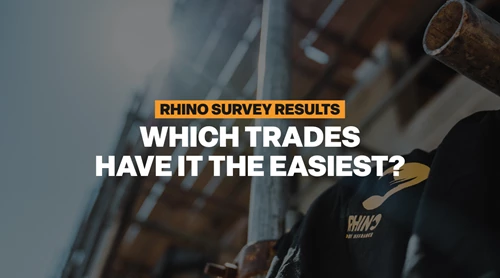
Which Trades Have It Easiest?
Rhino’s 2024 survey asked tradespeople a loaded question: what is the hardest trade? The answers could shock, or leave you unsurprised!
Starting your journey as a tradesperson is an exciting and thrilling thing to behold. Your career is right in front of your eyes, you have said no to the usual 9 till 5 office job, and it's time to get your hands dirty.
When approaching your trade, whether that's choosing which area to go into, where and who to train with and whether or not you will go it alone will require some thought. That's why we are here today, to offer up some legal considerations to keep in mind whilst you are on your journey to trade superstardom.
To kick things off, let's imagine you are fully trained and decide to set up shop. If you want to take on staff, then you will have to follow the necessary legislation set in law. In the UK, as a business owner, you must follow and set certain conditions for our employees, things such as: Paying the national minimum wage, having the right level of employee insurance, providing a safe workplace, and an employment contract, among various other things.
For starters, if you employ a fellow tradesperson, you will first need to check that they are legally allowed to work in the UK. That's because you will be registering them with HMRC, granting them the legal holiday entitlement, offering a pension scheme and providing sick pay.
Most of these conditions for a tradesman or woman will be set out in their employment contract. This is your legal document that sets out all working conditions and takes into account the law set in the UK. It is there to ensure you offer all the right conditions and that the employee adheres to your contract.
A few last main points for trade businesses wanting to take on staff:
As a tradesperson or trade business owner, you should 100% be considering your insurance options. Having the right level of cover will give your business the safety net it needs, as you will be secure in the knowledge that you will be protected should the proverbial hit the fan.
Most trades have varying levels of risk attached to them. Whether you are a Plumber, Electrician, Gardener or Gas Fitter, one wrong move and it could be lights out for your business.
In the UK, the law doesn't require you to have any insurance apart from Employees' Liability Insurance if you employ staff members and Van Insurance if you drive your own vehicle. Just because it's not written into law doesn't mean you don't need insurance. In fact, most customers, clients, suppliers, councils and contractors won't touch you with a barge pole unless you have a certain level of cover - mainly Public Liability Insurance which protects you in case you cause damage to a customer's property, injure them or a member of the public. Here is a lovely list of all of the trade insurance options we offer at Rhino Trade Insurance:
When it comes to the day that you are ready to enter the big, bad trade world on your own, you will have to decide on one of the various ways to set up your business. This will impact the types of insurance you need, what premiums you may have to pay and what level of cover you will require.
Sole Trader / Self-Employed Tradesperson
Starting your trade career as a sole trader means you run your own business and own it outright. You are essentially self-employed, which means you have to drum up all your own customers, work on all your admin, pay yourself, the taxman and everything else that comes with running a business as a one-man band.
As a sole trader, you must register your business with HMRC for tax reasons. If you earn above £1,000 a year (which, as a qualified tradesperson, you will absolutely do), then you will have to file your own self-assessment tax returns. Although it's still hard graft, this is the most straightforward way of setting yourself up in business.
Limited Company
As a tradesman or woman, you can choose to set up a limited company as a public or private entity. The difference is one doesn't publicly trade shares and keeps its finances fairly private. This is directly opposite to a publicly-traded company that you will find on the stock exchange, with finances readily available through research.
Limited companies are registered with Companies House in the UK. This is so they can operate and trade freely as a legal entity of the directors and shareholders. The company owns any assets, profits or liabilities, and the director will basically be an employee of that company. If the business fails, non of your personal finances will be affected or at risk.
As opposed to a sole trader, you are only liable for debts the company has up to the value of the shares you own. A sole trader, however, has personal and business assets, which are practically the same. To paint a picture, a Limited Company almost forms a shield around your personal assets should something go wrong.
Partnership
A partnership is similar to a self-employed business or sole trader, only this time it involves two or more people who share the business obligations. All partners are responsible for handling business debts, profits and losses. Regarding tax, each shareholder will have to pay tax and NI on any individual profits from the business.
The only difference is that you don't have to complete a corporate tax return with a partnership. This, therefore, means it's slightly more lenient regarding the legal side of things. It also allows you to invest greater capital as there is more than one person at the helm. Finally, you can collectively share any stresses and pool different pieces of knowledge to offer a better trade service to your customers.
Limited Liability Partnership
As the name suggests, this is similar to a Limited Company. This time though, it has a sprinkle of a partnership. Your assets are protected, and the liability you have is limited. The only difference this time is that all partners have the same level of responsibility when filing annual accounts.
Unlike a Partnership, any company directors in a limited liability partnership aren't directly responsible for debts and legalities. Finally, each partner will have to file their own personal taxes themselves.
It's a sad fact, but every person, tradesman, and business has to pay tax. Tax rules will change depending on which type of business you set up. For example, you will be required to pay income tax as a Sole Trader if your profit rises above £12,500 in a tax year. On the flip side, if you set a Limited Company up, you will need to pay corporation tax once your business starts making a profit. The current rate in the UK is 19%, but it will rise to 25% from 2023.
There's no rule of thumb, but we recommend hiring a decent accountant for your Limited Company. Finding a quality bookkeeper would be highly beneficial if you are a self-employed tradesman. A final point, watch out for VAT. VAT is a business tax that you start paying after you make more than £85,000 a year.
Some final points on legal considerations when starting your own trade business would be contracts and intellectual property. As a business, when you secure a customer or client, you should immediately create a written agreement to avoid any unnecessary legal disputes. All details should be included like: work undertaken, price, materials, and dates agreed for work. A contract that is signed essentially covers yours and the client's back.
Finally, your intellectual property is an area to consider when starting your own trade business. This relates to anything you have created or ideas you legally own, such as your company name, logos, inventions, brand, website domain and others. Intellectual property protects you by law if somebody tries to steal this information or your entire identity.
Here at Rhino, we live and breathe trade insurance for tradesmen and women all over the UK. We have created thousands of individual policies for various trades: carpet cleaners, upholsterers, paving installers, glazers, window cleaners and so on. Get in touch if you find a trade we don't cover!
If you'd like a quick and easy quote without having to enter all of your details, get one now in less than 60 seconds: Superfast quote engine
Alternatively, give our wonderful team a call on 0116 243 7904
Rhino’s 2024 survey asked tradespeople a loaded question: what is the hardest trade? The answers could shock, or leave you unsurprised!
Self-employment is booming in the UK, especially among tradespeople who value freedom, flexibility, and higher earning potential. Backed by our own survey data from over 500 tradespeople, this article dives into why so many in the industry choose to go it alone, despite the risks.
Rhino’s 2024 survey found nearly half of tradespeople would run out of money within 3 months if they couldn’t work. Learn how insurance can help you stay afloat.
Tell us your trade and get a tailored insurance quote for your business in seconds
Our team of experts are available to talk to Mon-Fri 08.30-17.30 and Sat 10.00-14.00

